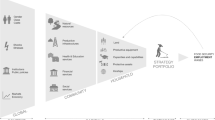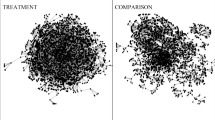Abstract
Social capital in the form of social resources or social networks is one of the most important livelihood capital of farmers, which can increase the labor productivity of poor households and increase income. It is important to explore the reasons underlying the livelihood strategy choices of farmers from the perspective of social capital under China’s rural revitalization strategy. In this study, the Liangshan Yi Autonomous Prefecture, a poverty-stricken mountainous area in southwestern China, was selected as the case study area, and multivariable linear regression models were constructed to analyze the influence of social capital on livelihood strategies. The results are as follows: (1) Individual social capital had a positive effect on non-agricultural livelihood strategies. On average, with a one-unit increase in individual social capital, the ratio of farmers’ non-agricultural income to total productive income (Income_Rto) increased by 0.002% and 0.062%, respectively. Collective social capital, with the Peasant Economic Cooperation Organization (PECO) as the carrier, had a negative effect on the non-agricultural livelihood strategies of farmers; on average, with a one-unit increase in PECO, Income_Rto decreased by approximately 0.053%. However, this effect was only significant in the river valley area. (2) The income differences among the different livelihood strategy types were explained by the livelihood strategy choices of farmers. As non-agricultural work can bring more benefits, the labor force exhibited one-way migration from villages to cities, resulting in a lack of the subject of rural revitalization. It is necessary to implement effective measures to highlight the role of PECO in increasing agricultural income for farmers. Finally, based on the above conclusions, policy recommendations with respect to livelihood transformation of farmers and rural sustainable development are discussed.
Similar content being viewed by others
References
Bhandari PB (2013) Rural livelihood change? Household capital, community resources and livelihood transition. J Rural Stud 32: 126–136. https://doi.org/10.1016/j.jrurstud.2013.05.001
Bian Y (2018) The Prevalence and the Increasing Significance of Guanxi. China Quarterly 1–25. https://doi.org/10.1017/S0305741018000541
Bijman J, Hu D (2011) The rise of new farmer cooperatives in China; evidence from Hubei Province. J Rural Cooperat 39: 99–113. https://doi.org/10.22004/ag.econ.163917
Brown DR, Stephens EC, Ouma JO, et al. (2006) Livelihood strategies in the rural Kenyan highlands. Afr J Agric Resour Econ 01(1). https://doi.org/10.22004/ag.econ.57019
Burt RS (2000) The Network Structure Of Social Capital. Res Organ Behav 22(00): 345–423. https://doi.org/10.1016/S0191-3085(00)22009-1
Cao M, Xu D, Xie F, et al. (2016) The influence factors analysis of households’ poverty vulnerability in southwest ethnic areas of China based on the hierarchical linear model, A case study of Liangshan Yi autonomous prefecture. Appl Geogr 66: 144–152. https://doi.org/10.1016/j.apgeog.2015.11.016
Chantarat S, Barrett CB (2007) Social network capital, economic mobility and poverty traps. J Econ Inequal 10(3): 299–342. https://doi.org/10.1007/s10888-011-9164-5
Chantarat S, Barrett CB (2012) Social network capital, economic mobility and poverty traps. J Econ Inequal 10(3): 299–342. https://doi.org/10.1007/s10888-011-9164-5
DFID (1999) Sustainable Livelihoods Guidance Sheets. London: Department for International Development.
Diniz FH, Hoogstra-Klein MA, Kok K, et al. (2013) Livelihood strategies in settlement projects in the Brazilian Amazon, Determining drivers and factors within the Agrarian Reform Program. J Rural Stud 32(4): 196–207. https://doi.org/10.1016/j.jrurstud.2013.06.005
Efendiev A, Sorokin (2013) Rural social organization and farmer cooperatives development in russia and other emerging economies, comparative analysis. J Dev Stud 3(14): 106–115.
Fang YP, Fan J, Shen MY, et al. (2014) Sensitivity of livelihood strategy to livelihood capital in mountain areas, Empirical analysis based on different settlements in the upper reaches of the Minjiang River, China. Ecol Indic 38(3): 225–235. https://doi.org/10.1016/j.ecolind.2013.11.007
Fei X, Hamilton GG, Zheng W (1992) From the Soil, the Foundations of Chinese Society, a Translation of Fei Xiaotong’s Xiangtu Zhongguo. Translated by Gary G: Hamilton, Wang Zheng Berkeley, University of California Press.
Fisher R (2013) ‘A gentleman’s handshake’, The role of social capital and trust in transforming information into usable knowledge. J Rural Stud 31: 13–22. https://doi.org/10.1016/j.jrurstud.2013.02.006
Garnevska E, Liu G, Shadbolt NM (2011) Factors for Successful Development of Farmer cooperatives in Northwest China. Int Food Agribus Man 14(4): 69–84. https://doi.org/10.1093/heapol/czq023
Granovetter M (1983) The Strength of Weak Ties, A Network Theory Revisited. Sociol Theor 1(6): 201–233. https://doi.org/10.1007/978-3-658-21742-6_55
Grootaert C, Oh GT, Swamy A (2002) Social Capital, Household Welfare and Poverty in Burkina Faso. J Afr Econ 11(1): 4–38. https://doi.org/10.1093/jae/11.1.4
Guo S, Lin L, Liu S, et al. (2019) Interactions between sustainable livelihood of rural household and agricultural land transfer in the mountainous and hilly regions of Sichuan, China. Sustain Dev 28(2). https://doi.org/10.1002/sd.1937
He XF (2013) Xinxiang Tu China, Beijing, China. Peking University Press. (In Chinese)
He RW, Li GQ, Liu SQ, et al. (2017) A review of rural poverty governance in China from the perspective of sustainable livelihoods. Chin Popul, Resour Environ (11):69–85. (In Chinese) https://doi.org/CNKI:SUN:ZGRZ.0.2017-11-008
Höhler J, Kühl R (2014) Position and performance of farmer cooperatives in the food supply chain of the EU-27. Annu Publ Cooper Econ 85(4): 579–595.
Hu B (2007) Informal Institutions and Rural Development in China. London, Routledge.
Jan I, Khattak MK, Khan MA, et al. (2012) Factors affecting rural livelihood choices in northwest Pakistan. Sarhad J Agric 28(4): 681–688.
Jia X, Huang J (2011) Contractual arrangements between farmer cooperatives and buyers in China. Food Policy 36(5): 656–666. https://doi.org/10.1016/j.foodpol.2011.06.007
Keister L (2009) Network resources and job mobility in China’s transitional economy. Res Sociol Work 19(19): 255–282. https://doi.org/10.1108/S0277-2833(2009)0000019012
Liang Q, Hendrikse G (2013) Core and common members in the genesis of farmer cooperatives in China. Manag Decis Econ 34(3–5): 244–257.
Lin N (1999) Social networks and status attainment. Annu Rev Socol (25): 467–487.
Lin N (2001) Social Capital, A Theory of Social Structure and Action. New York: Cambridge University Press.
Liu Z, Chen Q, Xie H (2018) Influence of the farmer’s livelihood assets on livelihood strategies in the western mountainous Area, China. Sustain 10(3): 875. https://doi.org/10.3390/su10030875
Long HL, Liu YS (2016) Rural restructuring in China. J Rural Stud 47(3). https://doi.org/10.1016/j.jrurstud.2016.07.028
Fischer C, Degefa T (2017) The determinants and economic impacts of membership in coffee farmer cooperatives, recent evidence from rural Ethiopia. J Rural Stud 50: 84–94. https://doi.org/10.1016/j.jrurstud.2016.12.010
Naithani S, Saha AK (2021) Social capital and livelihood strategies in response after 2013 Kedarnath disaster (India). Disaster Prev Manag 30(2):179–193. https://doi.org/10.1108/DPM-07-2019-0221
Narayan D, Pritchett L (1999) Cents and sociability, household income and social capital in rural Tanzania Con Dev Cult Change 47(4): 871–897.
Nawrotzki R, Hunter LM, Dickinson TW (2012) Natural resources and rural livelihoods, Differences between migrants and non-migrants in Madagascar. Demogr Res 26(26):661–700. https://doi.org/10.4054/DemRes.2012.26.24
Putnam, R (1993) The prosperous community-social capital and public life. Am Prospect 4(13): 35–42.
Putnam RD, Leonardi R, Nonetti RY (1993) Making Democracy Work, Civic Traditions in Modern Italy, Princeton. New Jersey, USA: Princeton University Press.
Rahut DB, Mottaleb KA, Ali A (2017) Rural livelihood diversification strategies and household welfare in Bhutan. Eur J Dev Res 1: 1–31. https://doi.org/10.1057/s41287-017-0120-5
Rahut DB, Scharf MM (2012a) Livelihood diversification strategies in the Himalayas. Aust J Agr Resour Ec 56(4): 558–582. https://doi.org/10.1111/j.1467-8489.2012.00596.
Rahut DB, Scharf MM (2012b) Non-farm employment and incomes in rural Cambodia. Asian-Pac Econ Lit 26(2): 54–71. https://doi.org/10.1111/j.1467-8411.2012.01345.
Sato H (2008) The impact of village-specific factors on household income in rural China. In: Sato H, Gustafsson BA, Li S and Sicular T (eds.), Inequality and Public Policy in China. Cambridge University Press, Cambridge, UK. pp 287–311.
Soltani A, Angelsen A, Eid T, et al. (2012) Poverty, sustainability, and household livelihood strategies in Zagros, Iran. Ecol Econ 79(4): 60–70. https://doi.org/10.1016/j.ecolecon.2012.04.019
Song Y, Qi G, Zhang Y, et al. (2014). Farmer cooperatives in China, diverse pathways to sustainable rural development. Int J Agr Sustain 12(2): 95–108. https://doi.org/10.1080/14735903.2013.858443
Verhofstadt E, Maertens M (2015) Can agricultural cooperatives reduce poverty? heterogeneous impact of cooperative membership on farmers’ welfare in Rwanda. Appl Econ Perspect P 37(1): 86–106. https://doi.org/10.1093/aepp/ppu021
Wang CC, Zhou XB (2013) Can social capital affect the income of migrant workers? — Based on the estimation and testing of the ordered response income model. Manage World 9: 55–68. (In Chinese) https://doi.org/CNKI:SUN:GLSJ.0.2012-07-00
Wang J (2013) Rural Marketization, Social Capital and the Mechanisms of Rural Family Income. Sociol Stud 28(03):119–144, 244.
Wang Y, Chen C, Araral E (2016) The Effects of Migration on Collective Action in the Commons, Evidence from Rural China. World Deve 88: 79–93.
Xi J (2017) Secure a Decisive Victory in Building a Moderately Prosperous Society in all Respects and Strive for the Great Success of Socialism with Chinese Characteristics for a New Era, a Report to the 19th CPC National Congress. Beijing: People’s Publishing House.
Xin B, Zhang YX, Geng DM (2018) An empirical analysis of the influence of rural social capital on the willingness to supply public goods. Financ Res 11: 107–120. (In Chinese) https://doi.org/CNKI:SUN:CZYJ.0.2018-11-012
Xu D, Zhang J, Rasul G, et al. (2015) Household livelihood strategies and dependence on agriculture in the mountainous settlements in the Three Gorges Reservoir Area, China. Sustain 7(5). https://doi.org/10.3390/su7054850
Yan Y (1998) The flow of gifts, reciprocity and social networks in a chinese village. J R Anth Inst 4(37): 185–186. https://doi.org/10.2307/2950240
Ye JY, Zhou YX (2010) Social capital conversion and migrant workers’ income, evidence from beijing migrant worker survey. Manage World 10: 34–46. (In Chinese) https://doi.org/10.1007/978-1-4419-5731-3_2
Yin K, Xiao Y (2020) Impact of farmers’ livelihood capital differences on their livelihood strategies in Three Gorges Reservoir Area. J Coast Res 103(sp1):258–262. https://doi.org/10.2112/SI103-055.1
Zhang X, Li G (2003) Does guanxi matter to nonfarm employment? J Comp Econ 31(2): 315–331. https://doi.org/10.1016/S0147-5967(03)00019-2
Zhang Y, Lu M (2009) Does social network help raise the wage level of migrant workers? Manage World 3: 45–54. (In Chinese) https://doi.org/CNKI:SUN:GLSJ.0.2009-03-007
Zhang YX, Tang YY (2018) The holistic research and reflection on the development of urban and rural integration in China — CSSCI literature based on subject retrieval. Social Scien 4: 64–69. (In Chinese) https://doi.org/CNKI:SUN:SHKJ.0.2018-04-010
Zhao XY, Zhao HL (2013) Comparison of social capital of farmers in Han, Tibetan and Hui Areas — Taking Zhangye City, Gannan Tibetan Autonomous Prefecture and Linxia Hui Autonomous Prefecture in Gansu Province as an example. Chin Popul, Resour Environ 23(3): 49–55. (In Chinese) https://doi.org/10.3969/j.issn.1002-2104.2013.03.008
Acknowledgements
We gratefully acknowledge financial supports from the National Natural Science Foundation of China (Grant Nos. 41461040, 41601614, 41601176), the Fundamental Research Funds for the Central Universities (JBK2102018) and the Sichuan Center for Rural Development Research (CR2107, Mechanism of Farmers’ Livelihoods on Ecological Security in Ethnic Regions in Sichuan Province).
Author information
Authors and Affiliations
Corresponding author
Rights and permissions
About this article
Cite this article
He, Rw., Guo, Sl., Deng, X. et al. Influence of social capital on the livelihood strategies of farmers under China’s rural revitalization strategy in poor mountain areas: A case study of the Liangshan Yi autonomous prefecture. J. Mt. Sci. 19, 958–973 (2022). https://doi.org/10.1007/s11629-020-6395-6
Received:
Revised:
Accepted:
Published:
Issue Date:
DOI: https://doi.org/10.1007/s11629-020-6395-6




